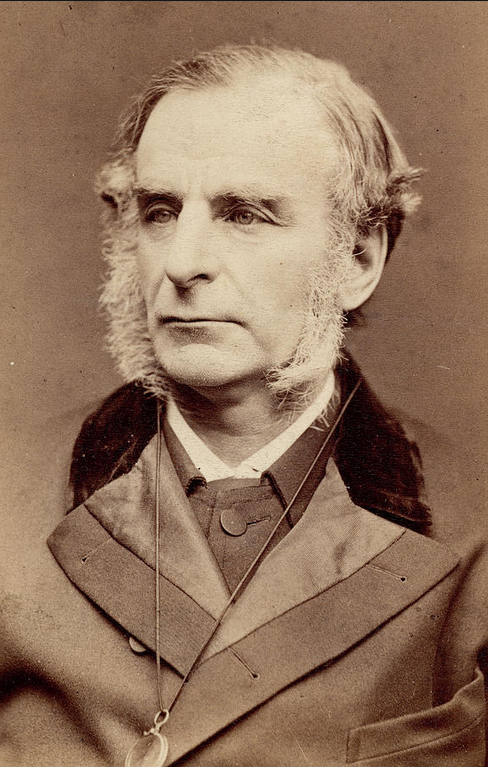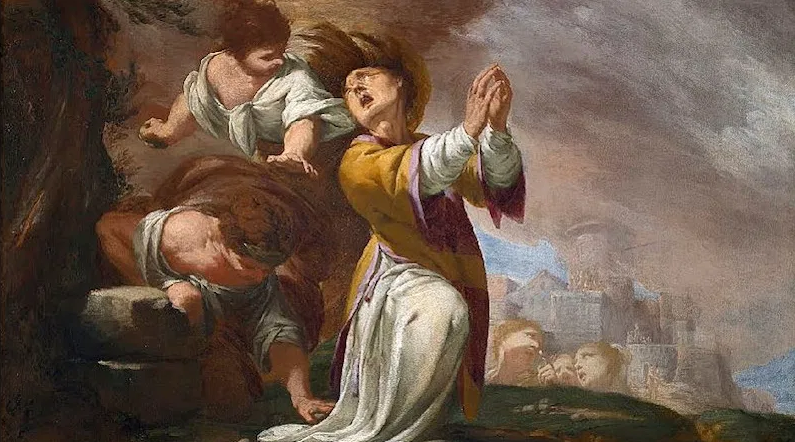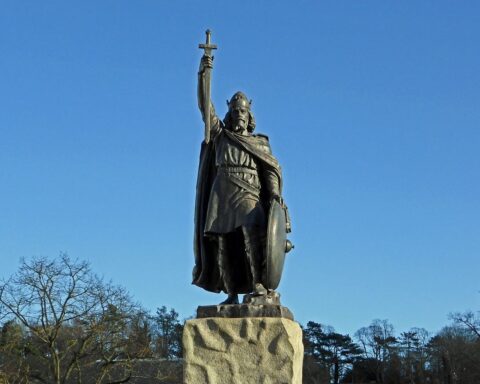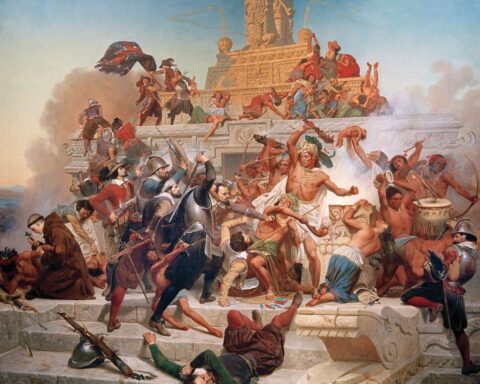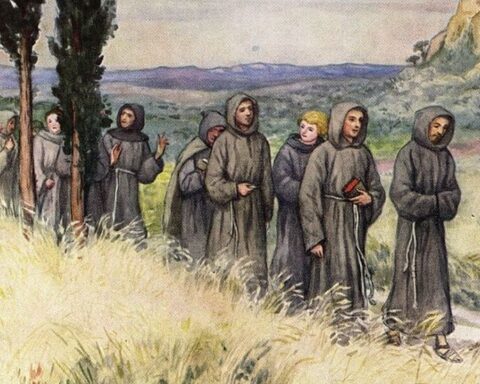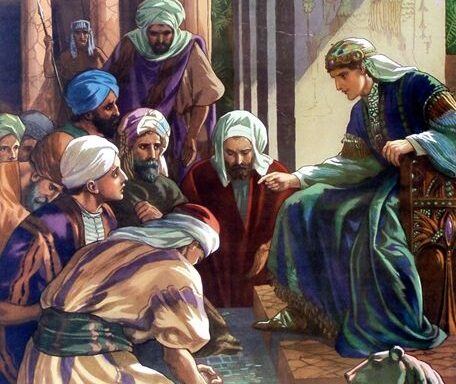Editor’s note: The following is extracted from Westminster Sermons, by Charles Kingsley (published 1881).
Psalm cxix. 31.
I have stuck unto thy testimonies: O Lord, confound me not.
What is the meaning of this text? What is this which the Psalmist and prophets call being confounded; being put to shame and confusion of face? What is it? It is something which they dread more than death; which they dread as much as hell. Nay, it seems in the mind of some of them to be part and parcel of hell itself; one of the very worst things which could happen to them after death: for what is written in the Book of the Prophet Daniel?—“Many of them that sleep in the dust of the earth shall awake, some to everlasting life, and some to shame and everlasting contempt.”
And we Christians are excusable if we dread it likewise. How often does St Paul speak of shame as an evil to be dreaded; just as he speaks, even more often, of glory and honour as a thing to be longed for and striven after. That one word, “ashamed,” occurs twelve times and more in the New Testament, beside St John’s warning, which alone is enough to prove what I allege, “that we have not to be ashamed before Christ at his coming.”
And how does the Te Deum—the noblest hymn written by man since St John finished his Book of Revelations—how does that end, but with the same old cry as that of the Psalmist in the 119th Psalm—
“O Lord, in thee have I trusted, let me never be confounded”?
Now it is difficult to tell men what being confounded means; difficult and almost needless; for there are those who know what it means without being told; and those who do not know what it means without being told, are not likely to know by my telling, or any man’s telling. No, not if an angel from heaven came and told them what being confounded meant would they understand him, at least till they were confounded themselves; and then they would know by bitter experience—perhaps when it was too late.
And who are they? What sort of people are they?
First, silly persons; whom Solomon calls fools—though they often think themselves refined and clever enough—luxurious and “fashionable” people, who do not care to learn, who think nothing worth learning save how to enjoy themselves; who call it “bad form” to be earnest, and turn off all serious questions with a jest. These are they of whom Wisdom says—“How long, ye simple ones, will ye love simplicity, and the scorners delight in their scorning, and fools hate knowledge? I also will laugh at your calamity, and mock when your fear cometh.”
Next, mean and truly vulgar persons; who are shameless; who do not care if they are caught out in a lie or in a trick. These are they of whom it is written that outside of God’s kingdom, in the outer darkness wherein are weeping and gnashing of teeth, are dogs, and whosoever loveth and maketh a lie.
And next, and worst of all, self-conceited people. These are they of whom Solomon says, “Seest thou a man who is wise in his own conceit? There is more hope of a fool than of him.” They are the people who will not see when they are going wrong; who will not hear reason, nor take advice, no, nor even take scorn and contempt; who will not see that they are making fools of themselves, but, while all the world is laughing at them, walk on serenely self-satisfied, certain that they, and they only, know what the world is made of, and how to manage the world. These are they of whom it is written—“He that being often reproved, hardeneth his neck, shall suddenly be destroyed, and that without remedy.” Then they will learn, and with a vengeance, what being confounded means by being confounded themselves, and finding themselves utterly wrong, where they thought themselves utterly right. Yet no. I do not think that even that would cure some people. There are those, I verily believe, who would not confess that they were in the wrong even in the bottomless pit, but, like Satan and his fallen angels in Milton’s poem, would have excellent arguments to prove that they were injured and ill-used, deceived and betrayed, and lay the blame of their misery on God, on man, on anything but their own infallible selves.
Who, then, are the people who know what being confounded means; who are afraid, and terribly afraid, of being brought to shame and confusion efface?
I should say, all human beings in proportion as they are truly human beings, are not brutal; in proportion, that is, as they are good or have the capacity of goodness in them; that is, in proportion as the Spirit of God is working in them, giving them the tender heart, the quick feelings, the earnestness, the modesty, the conscientiousness, the reverence for the good opinion of their fellow-men, which is the beginning of eternal life. Do you not see it in the young? Modesty, bashfulness, shame-facedness—as the good old English word was—that is the very beginning of all goodness in boys and girls. It is the very material out of which all other goodness is made; and those who laugh at, or torment, young people for being modest and bashful, are doing the devil’s work, and putting themselves under the curse which God, by the mouth of Solomon the wise, pronounced against the scorners who love scorning, and the fools who hate knowledge.
This is the rule with dumb animals likewise. The more intelligent, the more high-bred they are, the more they are capable of feeling shame; and the more they are liable to be confounded, to lose their heads, and become frantic with doubt and fear. Who that has watched dogs does not know that the cleverer they are, the more they are capable of being actually ashamed of themselves, as human beings are, or ought to be? Who that has trained horses does not know that the stupid horse is never vicious, never takes fright? The failing which high-bred horses have of becoming utterly unmanageable, not so much from bodily fear, as from being confounded, not knowing what people want them to do—that is the very sign, the very effect, of their superior organization: and more shame to those who ill-use such horses. If God, my friends, dealt with us as cruelly and as clumsily as too many men deal with their horses, He would not be long in driving us mad with terror and shame and confusion. But He remembers our frame; He knoweth whereof we are made, and remembereth that we are but dust: else the spirit would fail before Him, and the souls which He hath made. And to Him we can cry, even when we know that we have made fools of ourselves—Father who made me, Christ who died for me, Holy Spirit who teachest me, have patience with my stupidity and my ignorance. Lord, in thee have I trusted, let me never be confounded.
But some will tell us—It is a sign of weakness to feel shame. Why should you care for the opinion of your fellow-men? If you are doing right, what matter what they say of you?
Yes, my friends, if you are doing right. But if you are not doing right—What then?
If you have only been fancying that you are doing right, and suspect suddenly that you have been very likely doing wrong—What then?
When a man tells me that he does not care what people think of him; that they cannot shame him: in the first place, I do not quite believe that he is speaking truth; and in the next place, I hope he is not speaking truth. I hope—for his own sake—that he does care what people think of him: or else I must suspect him of being very dull or very conceited.
And if he tells me that the old prophets, and holy, and just, and heroic men in all ages, never cared for people’s laughing at them and despising them, provided they were doing right according to their own conscience: I answer—That he knows nothing about the matter; that he has not honestly read the writings of these men. I say that the Psalmist who wrote Ps. 119, was a man, on his own shewing, intensely open to the feeling of shame, and felt intensely what men said of him; felt intensely slander and insult. We talk of independent and true patriots now-a-days. I will tell you of four of the noblest patriots the world ever saw, who were men of that stamp. I say that Isaiah was such a man; that Jeremiah was such a man; that Ezekiel was such a man; that their writings shew that they felt intensely the rebukes and the contempt which they had to endure from those whom they tried to warn and save. I say again that St Paul, as may be seen from his own epistles, was such a man; a man who was intensely sensitive of what men thought and said of him; yearning after the love and approbation of his fellow-men, and above all of his fellow-countrymen, his own flesh and blood; and that that feeling in him, which may have been hurtful to him before he was converted, was of the greatest use to him after his conversion; that it enabled him to win all hearts, because he felt with men and for men; and gained him over the hearts of men such a power as no mere human being ever had before or since.
And I say that of all men the Lord Jesus Christ, the Son of Man, had that feeling; that longing for the love and appreciation of men—and above all, for the love and appreciation of His countrymen according to the flesh, the Jews, He had—strange as it may seem, yet there it is in the Gospels, written for ever and undeniable—that capacity of shame which is the mark of true nobleness of soul.
He endured the cross, despising the shame. Yes: but there are too many on earth who endure shame with brazen faces, just because they do not feel it. If He had not felt the shame, what merit in despising it? It was His glory that He felt the shame; and yet conquered the shame, and crushed it down by the might of His love for fallen man.
Do you fancy that in His agony in the garden, when His sweat was as great drops of blood, that it was only bodily fear of pain and death which crushed Him for the moment? He felt that, I doubt not; as He had to taste death for every man, and feel all human weakness, yet without sin. But it was a deeper, more painful, and yet more noble feeling than mere fear which then convulsed His sacred heart; even the feeling of shame—the mockery of the crowd—the—But I dare not enlarge on anything so awful; at least I will say this—That he had to cry as none ever cried before or since, “O God, in thee have I trusted, let me never be confounded;” for he had, it seems, actually, at one supreme moment, to feel confounded; and to say, “My God, my God, why hast thou forsaken me?” That was the highest and most precious jewel of all his self-sacrifice. Of it let us only say—
Our Lord and Saviour stooped to be confounded for a moment, that we might not be confounded to all eternity.
And therefore our blessed Lord is to us an example. As he did, so must we try to do. He entered into glory, by suffering shame, and yet despising it. He submitted to be confounded before men, that He might not be confounded in the sight of God His Father. And so must we, sometimes, at least. Every man who makes up his mind to do right and to be good, must expect ridicule now and then. Rich or poor, boy or man, if you try to keep your hands clean, and your path straight, the world will think you a fool, and will be ready enough to tell you so; for it is cruel and insolent enough. And the more tender your heart; the more you wish for the love and approbation of your fellow-men; the more of noble and modest self-distrust there is in you, the more painful will that be to you; the more you will be tempted to obey man, and not God, and to follow after the multitude to do evil, merely to keep the peace, and live a quiet life, and not be laughed at and tormented. And thus the fear of man brings a snare; and naught can deliver you out of that snare, save the opposite fear—the fear of God, which is the same as trust in God.
Joseph of old feared God when he was tempted; and said, “How can I do this great wickedness, and sin against God?” But I doubt not there were plenty in Egypt who would have called him a fool for his pains. There are hundreds of gay youths in any great city—there may be a few in this Abbey now for aught I know—who would have laughed loudly enough at Joseph for throwing away the opportunity of what certain foolish French have learnt to call, as its proper name, a “bonne fortune”—a piece of good luck.—As if breaking the 7th Commandment could be aught but bad fortune, and the cause of endless miseries in this life and the life to come.
And it may be, as Joseph was all but confounded and brought to shame, at least from man, when he found that all that he gained by fearing God was—a false accusation, the very shame and contempt from which he most shrank, danger of death, imprisonment in a dungeon.
But he was true to God, and God was true to him. He trusted in God; and therefore he feared God: for he trusted that God’s laws were just and good, and worth obeying; and therefore he was afraid to break them. He trusted in God; and therefore he hoped in God; for he trusted that God was strong enough and good enough to deliver him out of prison, and make his righteousness as clear as the light and his just dealing as the noonday. He cried out of his prison, doubt it not, many a time and oft—“O God, in thee have I trusted; let me never be confounded.”
And he was not confounded. He came into Egypt a slave. He was cast into prison on a shameful accusation: but he came out of prison to be a ruler and a prince, honoured and obeyed by the greatest nation of the old world. He trusted in God, and he was not confounded for ever; even as the Lord Christ trusted in God and was not confounded for ever; even as we, if we do not wish to be confounded for ever, must trust in God; and instead of being scornful, careless, conceited, must fear Him, and say, “My flesh trembleth because of Thy righteous judgments.” And then the laughter of fools will end, where it began, in harmless noise, like (says Solomon) the crackling of thorns under a pot. Then, whosoever may scorn you on earth, the great God in heaven will not scorn you. You may be confounded for a moment here on earth. Worldly people may take advantage of your misfortunes, and cry over you—There, there, so would we have it. Take him and persecute him, for there is none to deliver him; where is now his God? So it may be with you; for as surely as you fall, many a cur will spring up and bark at you, who dared not open his mouth at you while you stood safe. Or—worse by far than that—the world may take hold of your really weak points, of your inconsistencies, of your faults and failings; and cry—Fie on thee, fie on thee. We saw it with our eyes. For all his high professions, for all his talk of truth and justice, he is no better than the rest of the world. And that scoff does go very near to confound a man; because he feels that it is half true, half deserved, and is afraid that it may be quite true and quite deserved: and then confounded indeed he would be, by his own conscience and by God, as well as by man. All he can do is, to cry to God, like him who wrote the 119th Psalm,—I have stuck unto thy testimonies: O Lord, confound me not. I know I am weak, ignorant, unsuccessful; full of faults too, and failings, which make me ashamed of myself every day of my life. I have gone astray like a sheep that is lost. But seek thy servant, O Lord, for I do not forget thy commandments. I am trying to learn my duty. I am trying to do my duty. I have stuck unto thy testimonies: O Lord, confound me not. Man may confound me. But do not thou, of thy mercy and pity, O Lord. Do not let me find, when I die, or before I die, that all my labour has been in vain; that I am not a better man, not a wiser man, not a more useful man after all. Do not let my grey hairs go down with sorrow to the grave. Do not let me die with the miserable thought that, in spite of all my struggles to do my duty, my life has been a failure, and I a fool. Do not let me wake in the next life, like Dives in the torment, to be utterly confounded; to find that I was all wrong, and have nothing left but everlasting disappointment and confusion of face. O Lord, who didst endure all shame for me, save me from that most utter shame. O God, in thee have I trusted; let me never be confounded.
Wake in the next life to find oneself confounded? Alas! alas! Many a man wakes in this life to find himself that; and really sometimes by no fault, seemingly, of his own: so that all he can do is to be dumb, and not to open his mouth, for it is God’s doing. For a man’s worst miseries and sorrows are, too often, caused not by himself, but by those whom he loves.
Consider the one case of vice, or even of mere ingratitude, in those nearest and dearest to a man’s heart; and of being so confounded through them, and by them, in spite of all love, care, strictness, tenderness, teaching, prayers—what not—and all in vain.
No wonder that, under that bitterest blow, valiant and virtuous men, ere now, have never lifted up their heads again, but turned their faces to the wall, and died: and may the Lord have mercy on them. Confounded they have been in this world; confounded they will not be, we must trust, in the world to come. The Lord of all pity will pity them, and pour His oil and wine into their aching wounds, and bring them to His own inn, and to His secret dwelling-place, where the wicked cease from troubling, and the weary are at rest.
One word more, and I have done. Do you wish to pray, with hope that you may be heard,—O Lord, confound me not, and bring me not to shame? Then hold to one commandment of Christ’s. Do to others as you would they should do to you. For with what measure you measure to your fellow-men, it shall be measured to you again. Have charity, have patience, have mercy. Never bring a human being, however silly, ignorant, or weak, above all any little child, to shame and confusion of face. Never, by cruelty, by petulance, by suspicion, by ridicule, even by selfish and silly haste; never, above all, by indulging in the devilish pleasure of a sneer, crush what is finest, and rouse up what is coarsest in the heart of any fellow-creature. Never confound any human soul in the hour of its weakness. For then, it may be, in the hour of thy weakness, Christ will not confound thee.
